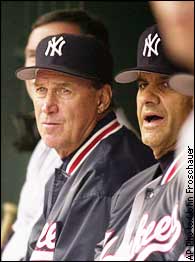 |
|
| | Friday, April 28 Stottlemyre to begin treatment, continue coaching | |||||
| Associated Press SEATTLE -- New York Yankees pitching coach Mel Stottlemyre has a form of blood cancer that he said was diagnosed about a year ago. Stottlemyre, 58, will begin treatment in New York immediately but plans to keep working with the team.
"I'm at a loss for words," Roger Clemens said. "When I got to see him, it was after he talked to all you reporters. I just gave him a hug. You don't have anything to say. You're just hoping and knowing he's going to be all right." The treatment will include four months of chemotherapy, meaning Stottlemyre will miss the Yankees' home opener against Texas on Tuesday. He does not expect to miss many games this season. In Phoenix, Todd Stottlemyre said his father's optimism bolstered the entire family. "I mean, here he had a son go through a similar deal where leukemia had taken his life, and now to have to battle it in his adult life," Todd said. "Yet to do it as courageous as he is and with the attitude he has, to me, gives him a fighting chance." Mel Stottlemyre and his wife, Jean, received the National Recognition Award from the Leukemia Society of America in 1992. Yankees manager Joe Torre -- who had prostate cancer surgery last year -- said bullpen coach Tony Cloninger will fill in for Stottlemyre for the opener and whenever necessary for the two-time defending World Series champions. Stottlemyre told Torre about his cancer after the manager's operation in March 1999. "It's a blow and it hits you hard," Torre said. "It's a scary situation whenever you mention cancer." Suspended Yankees slugger Darryl Strawberry had colon cancer surgery in October 1998. "There always seems to be something new with this team," shortstop Derek Jeter said. "It seems like cancer is spreading like the common cold. It's unfortunate, but the positive side of it is that he's supposed to be all right. So all of our thoughts and prayers are with him." In his fifth season with the Yankees, Stottlemyre is considered one of baseball's top pitching coaches. His staffs have finished in the AL's top five in team ERA in the past four seasons, including first in 1997 and '98. Todd Stottlemyre has credited his father's support for his unprecedented attempt to return from a partially torn rotator cuff to pitch without surgery. Todd wanted to see his father immediately but is scheduled to pitch Monday in San Diego. "What he said to me this morning was 'Win one for me tomorrow,' " Todd said, choking back tears. "I'd love to get out of here now, but at the same time I know he wants me to stay." After chemotherapy, Stottlemyre will have a stem-cell transplant. He will be treated four days a week for four weeks as an outpatient and not require hospitalization. His blood will be cleansed through a machine and reintroduced in his body, he said. "The doctors have used the word cure, which I'm very thankful for," Stottlemeyre said. "They've told me everything is in my favor. "It's not painful. There are a few minor side effects from the medication, but it's nothing I won't be able to handle." He said his condition showed up in a normal physical last spring. He said he was borderline anemic, a blood deficiency. He said he was not fatigued and would not have known about it had he not been diagnosed through blood tests. Yankees players did not know about their pitching coach's condition. "I've kept it quiet for a period of time," Stottlemyre said. "Surprisingly, it hasn't been all that difficult. "My prognosis is good. It's very good. Like all treatments of cancer, things are changing every day." Stottlemyre, who pitched for the Yankees from 1964-74, said it is important for him to keep working. But he said he would step down if his health problems create any problems. "Joe's made it easier on me because he's been through the battle," he said. "We've had a lot of adversities on the club. This is just another one." After the game, a 9-3 loss by the Yankees to Seattle, Mariners manager Lou Piniella said the news about Stottlemyre, his teammate with the Yankees in 1974, distressed him.
"It's a shame," he said. "I'm heartbroken. I was thinking
about that during the ballgame. He's a good friend. Let's hope that
he overcomes this thing." |  | |||||
